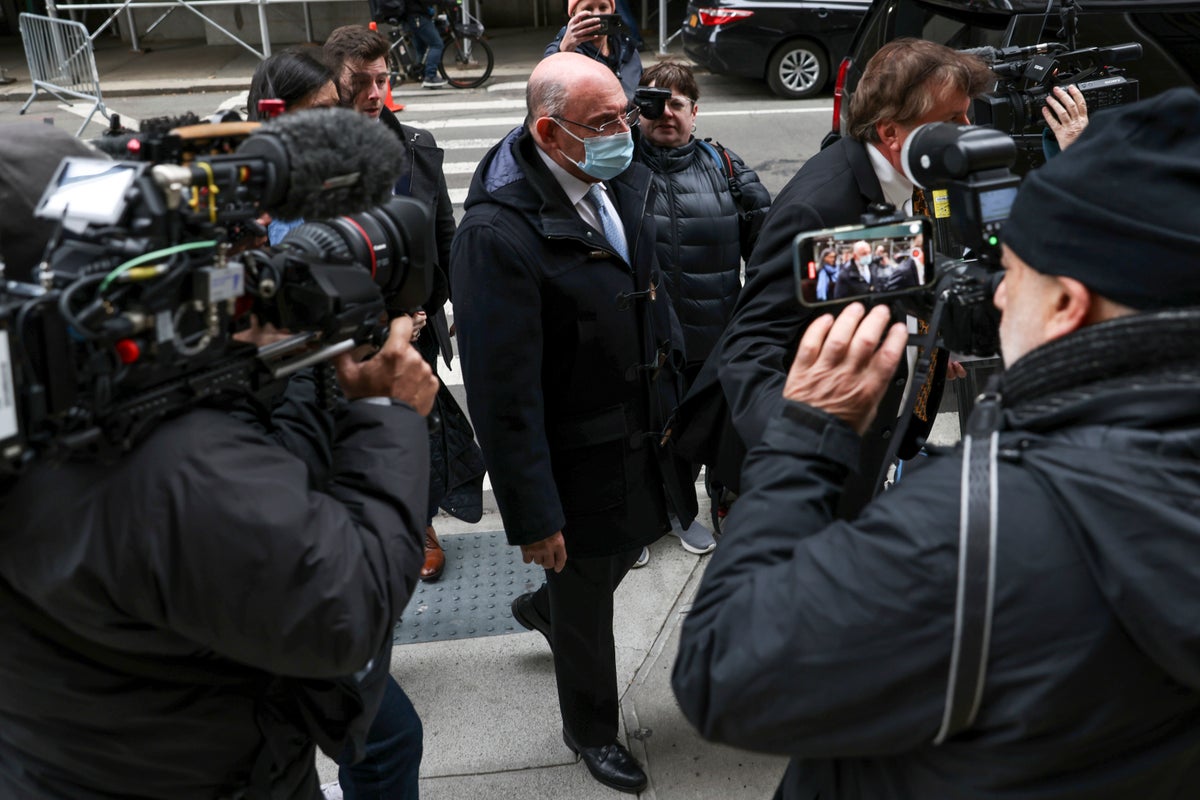
Closing arguments at the Trump Organization’s criminal tax fraud trial got off to a rocky start Thursday as a lawyer for the company was caught showing jurors portions of witness testimony that had previously been stricken from the official court record.
Prosecutors objected to the display about an hour into lawyer Susan Necheles’ presentation. The judge, Juan Manuel Merchan, admonished Necheles and halted arguments so she could remove any other precluded testimony from a slideshow she was showing to jurors.
Necheles said she didn’t intend to show any testimony that had been stricken as a result of a sustained objection. Merchan noted that the objections themselves had been removed from the excerpts Necheles showed, but not the objectionable testimony.
Necheles resumed her closing argument after a half-hour break. Merchan briefly discussed the transcript issue with jurors and Necheles proceeded to show them the correct version, prefacing her remarks with a mea culpa: “Ladies and gentlemen, I apologize for that error.”
The transcript kerfuffle was just the latest dust-up involving Trump Organization lawyers. Earlier this week, Merchan scolded the defense for submitting hundreds of pages of court papers just before midnight Sunday.
The Trump Organization, the entity through which former President Donald Trump manages his real estate holdings and other ventures, is accused of helping some top executives avoid paying income taxes on company-paid perks, such as apartments and luxury cars.
The tax fraud case is the only trial to arise from the Manhattan district attorney’s three-year investigation of Trump and his business practices.
The Trump Organization’s longtime finance chief, Allen Weisselberg, has admitted that he came up with the long-running scheme on his own, that he did so to save money on his own personal income taxes, and that neither Trump nor Trump's family knew what he was doing.
Prior to the interruption, Necheles was using excerpts from Weisselberg’s three days of testimony to underscore her argument that the executive was only intending to benefit himself, not the Trump Organization, and that the company shouldn’t be blamed for his transgressions.
“We are here today for one reason and one reason only: the greed of Allen Weisselberg,” Necheles said, her remarks accompanied at one point by the wail of a siren from an emergency vehicle outside.
Weisselberg, a Trump Organization senior adviser and former chief financial officer, started working for Trump’s real estate-developer father, Fred Trump, in 1973 and joined Donald Trump’s company in 1986.
“Along the way, he messed up. He got greedy. Once he got started, it was difficult for him to stop,” Necheles said.
Prosecutors and another company lawyer are expected to make their closing arguments Thursday afternoon. The prosecutors argue that the Trump Organization — through its subsidiaries Trump Corp. and Trump Payroll Corp. — is liable because Weisselberg, the longtime finance chief, was a “high managerial agent” entrusted to act on behalf of the company and its various entities.
If convicted, the Trump Organization could be fined more than $1 million. It could also face some difficulty making future deals.
Necheles argued that the case against the company is tenuous and that the 1965 state law underlying some of the charges requires prosecutors to show Weisselberg intended to benefit the company, not just himself.
Weisselberg pleaded guilty in August to dodging taxes on $1.7 million in extras and testified against the Trump Organization in exchange for a promised sentence of five months in jail.
The former finance chief testified that he conspired to hide his perks with the company’s senior vice president and controller, Jeffrey McConney, by adjusting payroll records to deduct their cost from his salary. The arrangement reduced Weisselberg’s tax liability, while also saving the company money because it didn’t have to give him a hefty raise to cover the cost of the perks and additional income taxes he would have incurred.
“I knew in my mind that there was a benefit to the company,” Weisselberg testified.
But Necheles argued that any benefit to the company was ancillary, mininal and unintentional.
“He is atoning for his sins, but as part of the plea deal the prosecution forced him to testify against the company he helped built,” Necheles told jurors. “Now the prosecution’s case rests on one thing: convincing you, the jurors, that Mr. Weisselberg’s actions were done in behalf of the company.”
“You are going to see there was no such intent,” Necheles added. “The purpose of Mr. Weisselberg’s crimes was to benefit Mr. Weisselberg.”







